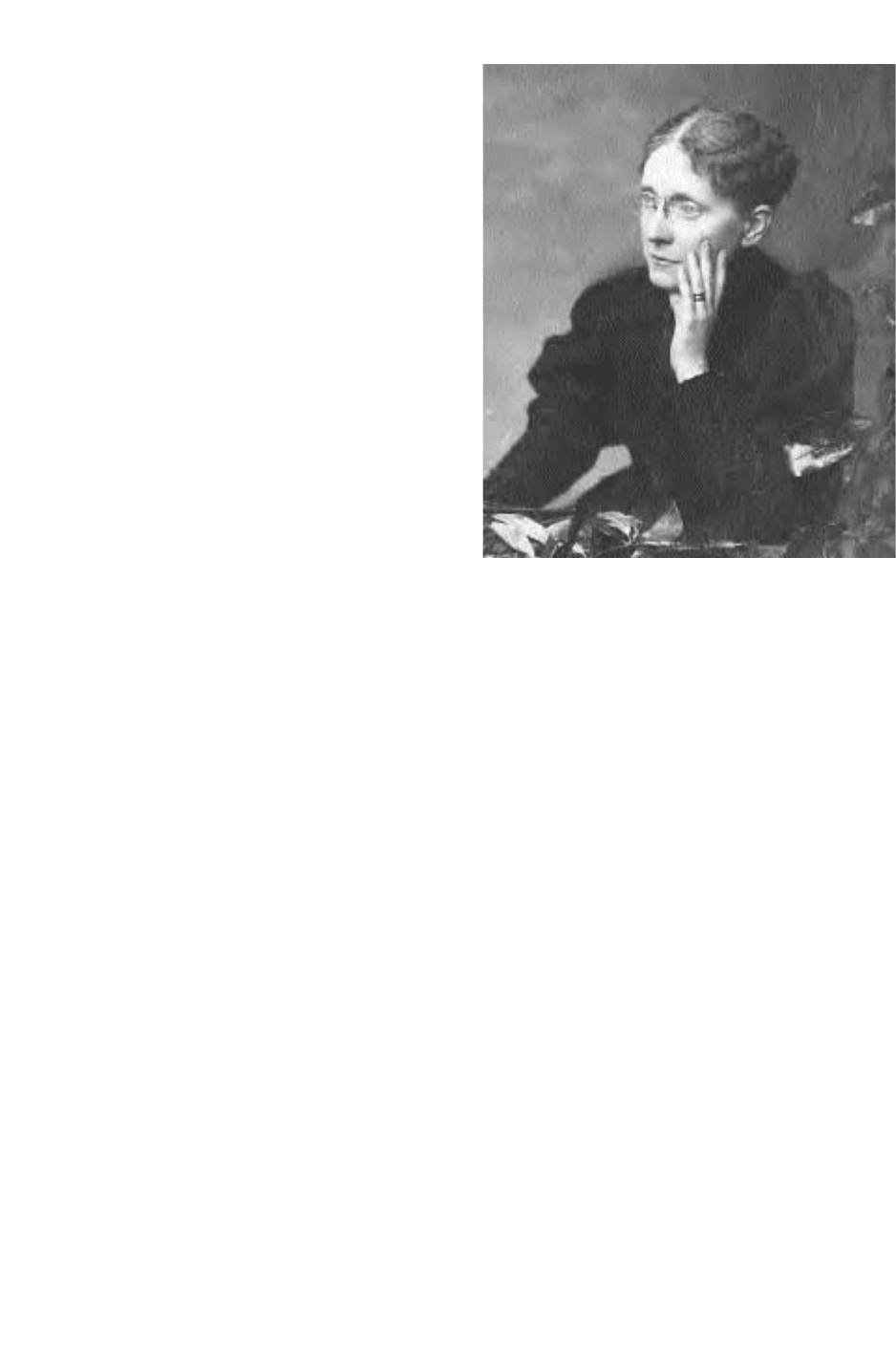Schenken Suzanne O’Dea. From Suffrage to the Senate: An Encyclopedia of American Women in Politics (2 Volumes)
Подождите немного. Документ загружается.


decade the WCTU became increasingly
politically active by forging an alliance
with the Prohibition Party and endorsing
presidential candidates. In addition,
Willard successfully lobbied the Prohibi-
tion Party to include a suffrage plank in its
1888 platform. She led the WCTU in ex-
panding its social reform programs to en-
compass establishing free kindergartens,
reducing the workday to eight hours,
passing protective labor legislation, rais-
ing the legal age of consent for sex, tough-
ening rape laws, and closing businesses on
Sunday.
See also Suffrage; Temperance
Movement, Women in the; Woman’s
Christian Temperance Union
References Lee, “Do Everything” Reform:
The Oratory of Frances E. Willard (1992).
Willebrandt, Mabel Walker (1889–1963)
The first female public defender in the United States, Mabel Walker Wille-
brandt became an assistant attorney general in 1921, making her the first
woman to hold a permanent subcabinet-level appointment. Seven years
later, in 1928, she chaired the Credentials Committee of the 1928 Repub-
lican National Convention and with that appointment became the first
woman to chair an important national convention committee for either
party. Throughout her career, she worked to advance the opportunities
and careers of other women lawyers.
Born in a sod dugout in southwestern Kansas, Willebrandt attended
Park College and Academy in Kansas from 1906 to 1907. She married in
1910 and moved to Arizona because of her husband’s poor health. She
earned her teaching certificate from Arizona’s Tempe Normal School in
1911, and the couple moved to the Los Angeles area, where she taught
school during the day and attended law school at night, earning her bach-
elor of laws degree from the University of Southern California in 1916 and
her master of laws degree from the same school the next year. She began
her law career as the assistant public defender in Los Angeles, working on
more than 2,000 cases brought against women, particularly charges for
prostitution. By 1918, she had established herself within the legal profes-
sion in Los Angeles, helped organize the Women’s Law Club of Los Ange-
les County, and developed an active private practice.
Willebrandt, Mabel Walker 699
Frances Willard,
president of the
Woman’s Christian
Temperance Union
and suffragist leader,
between 1880 and
1898 (Library of
Congress)

Willebrandt began her political career by campaigning for candidates
and became a member of the California Republican State Central Commit-
tee which, combined with her legal skills, led to her appointment in 1921 as
a U.S. assistant attorney general by President Warren G. Harding. In charge
of Prohibition enforcement, taxes, and the Bureau of Federal Prisons, her
responsibilities included coordinating the enforcement programs of the
Treasury Department, the Coast Guard, and state and local law enforcement
agencies. Willebrandt became most widely known for her prosecution of
Prohibition cases, leading New York governor Alfred E. Smith to refer to her
as “Prohibition Portia.” She responded:“It is not particularly gratifying to be
thought of merely as a Nemesis of bootleggers, a chaser of criminals.” Her
first big cases came in 1922, when she broke two southern rings, one in Sa-
vannah, Georgia, and the other in Mobile, Alabama, in which Congressman
John W. Langley of Kentucky was found guilty. Willebrandt developed a
novel strategy for enforcing the Volstead Act when she decided to use in-
come tax evasion as a way to stop bootleggers. She preferred enforcing tax
laws because, as she said: “They require detached and abstract thought, an
intellectual exercise of which women were once thought incapable.”
Willebrandt aggressively pursued those who broke the law, filing be-
tween 49,000 and 55,000 criminal and civil cases annually. In these cases,
she helped establish the constitutional validity of the Volstead Act and
other laws through U.S. Supreme Court decisions. Of the thirty-nine cases
she argued before the Court, she won thirty-seven. By 1929, of all the
lawyers who had argued cases before the Court, she ranked fourth in the
total number of cases she had presented.
With prisons filling with Volstead violators, the need for additional
space in them grew, as did the need to review the related policies. Wille-
brandt began by calling for a federal women’s prison, for which she sought
support from the Women’s Joint Congressional Committee (WJCC).
With the WJCC’s help, she found support from the League of Women
Voters, the Woman’s Christian Temperance Union, the General Federa-
tion of Women’s Clubs (GFWC), and several other groups. She also be-
lieved that young, male, first-time offenders serving their sentences in
prison were further corrupted by the exposure to more experienced law
violators and that a federal reformatory for them was needed. By enlisting
the support of the Young Men’s Christian Association, GFWC, American
Bar Association, Kiwanis Club International, and other groups, Wille-
brandt succeeded in creating a federal reformatory. In addition, she
sought to improve prison conditions and to provide work within prisons.
Her first task, however, was to identify and remove corrupt and incompe-
tent prison officials by planting government agents posing as inmates
within the facilities. With the support of GFWC and others interested in
700 Willebrandt, Mabel Walker

prison reform, she then began developing prison industries to provide
employment for every prison inmate, engaging in perennial battles for ap-
propriations for the programs.
In 1928, Willebrandt turned some of her attention to the Republican
Party and to making Herbert Hoover the party’s presidential nominee.
She attended the Republican National Convention as a Hoover delegate
and was permanent chair of the party’s Credentials Committee. As Cre-
dentials Committee chair, Willebrandt worked to ensure that the com-
mittee decided in favor of delegates pledged to Hoover, which helped him
obtain the nomination. A dedicated Hoover supporter, Willebrandt
worked for him throughout the campaign and became the center of a na-
tional controversy. In a speech to a group of Methodists who supported
Prohibition, Willebrandt questioned Democratic presidential nominee Al
Smith’s commitment to enforcing the Volstead Act and characterized
Hoover as ready to provide the necessary leadership in enforcing it. In that
and subsequent speeches to other religious groups, she referred to Smith’s
religion, Catholicism, making it an issue in the campaign. Willebrandt was
attacked by the press for injecting religion into the presidential race, and
some Republican leaders wanted her silenced. One leading feminist, how-
ever, viewed the dispute as testimony that a woman had enough political
power to be the center of a disagreement. Commenting on the criticism
heaped on Willebrandt, Democratic Party leader Emily Newell Blair said
that Willebrandt was the first woman to make a place for herself as a “great
figure in politics.” After Hoover won the election, Willebrandt concluded
that he was not as committed to enforcing Prohibition as she had thought
and resigned as assistant attorney general in May 1929.
Willebrandt joined Aviation Corporation as general counsel and be-
gan a new career in the emerging field of aviation law, chairing a commit-
tee on the topic for the American Bar Association from 1938 to 1942. She
also pioneered in the area of radio law, winning a U.S. Supreme Court de-
cision that upheld the Federal Radio Commission’s power to regulate
broadcasting. In addition, she worked for Louis B. Meyer of MGM Studio
and Hollywood stars and other celebrities.
See also General Federation of Women’s Clubs; Langley, Katherine Gudger;
League of Women Voters; Woman’s Christian Temperance Union; Women’s
Joint Congressional Committee
References Brown, Mabel Walker Willebrandt (1984); New York Times, 9 April
1963; Strakosh, “A Woman in Law” (1927).
Williams v. Zbaraz (1980)
Decided with Harris v. McRae, Williams v. Zbaraz challenged an Illinois
statute prohibiting state medical assistance payments for all abortions
Williams v. Zbaraz 701

except those to save the life of the woman seeking the abortion. Approach-
ing this case as a class action suit, the challengers argued that even though
Medicaid funding for medically necessary abortions had ended with the
passage of the Hyde Amendment, the state still had an obligation to pay for
them under the equal protection clause of the Fourteenth Amendment.
The U.S. Supreme Court rejected the argument, saying that a state
was not obligated to pay for medically necessary abortions that were not
covered by Medicaid and that the policy did not violate the equal protec-
tion clause of the Fourteenth Amendment.
See also Abortion; Harris v. McRae
References Williams v. Zbaraz, 448 U.S. 358 (1980).
Wilson, Edith Bolling Galt (1872–1961)
First lady from 1915 to 1921, Edith Wilson was the wife of President
Woodrow Wilson. After President Wilson suffered a stroke in October
1919, Edith Wilson controlled who could see her husband during the six
months of his convalescence, and every document that the president re-
ceived went first to his wife. Edith Wilson did not attempt to run the pres-
idency, but her control over access to the president determined which
matters received his attention and which would languish. Edith Wilson
kept the president’s condition a secret from all except his doctor and a few
intimates; she did not inform the cabinet.
Born in Wytheville, Virginia, Edith Wilson learned to read and write
at home and attended Martha Washington College, a girls’ preparatory
school, from 1887 to 1888 and Powell’s School from 1889 to 1890. Her
first husband, Norman Galt, died in 1908. Edith Wilson was Woodrow
Wilson’s second wife; his first wife, Ellen, had died in 1914. Edith Wilson
and Woodrow Wilson met at the White House when she was there for tea,
and after a brief courtship, they married.
References Weaver, “Edith Bolling Wilson as First Lady: A Study in the Power of
Personality, 1919–1920” (1985).
Wilson, Heather (b. 1960)
Republican Heather Wilson of New Mexico was elected to the U.S. House
of Representatives on 23 June 1998. Wilson won her seat in a special elec-
tion to fill the vacancy created by the death of the incumbent. She is the
first woman veteran ever elected to Congress.
Born in Keene, New Hampshire, Wilson earned her bachelor of sci-
ence degree from the U.S. Air Force Academy in 1982. She earned her
master’s of philosophy in 1984 and her doctor’s degree in philosophy in
1985, both from Oxford University. Wilson served as an Air Force officer
702 Wilson, Edith Bolling Galt

until 1989, when she became director for European defense policy and
arms control on the National Security Council staff. In 1991 she founded
a business consulting firm that worked with senior executives in U.S. de-
fense and scientific corporations. She served as cabinet secretary of the
New Mexico Children, Youth, and Families Department, leading the de-
velopment of programs that addressed juvenile crime, abuse and neglect,
and child care and early education.
After winning the special election in June 1998, Wilson won reelec-
tion to her seat in the November general elections of that year. Her con-
gressional priorities include improving teacher training, strengthening
curricula and early childhood education, eliminating the marriage penalty
in income taxes, and maintaining the solvency of Social Security. She cast
her vote in Congress for a bill to reform the Internal Revenue Service.
See also Congress, Women in
References “Heather Wilson, R-N.M. (1)” (1998); www.house.gov/wilson/
biography/index.htm.
Wingo, Effiegene Locke (1883–1962)
Democrat Effiegene Wingo of Arkansas served in the U.S. House of Rep-
resentatives from 4 November 1930 to 3 March 1933. After the death of
her husband, Representative Otis Wingo, Effiegene Wingo was elected to
fill the vacancy and then to a full term. She worked to establish a game
refuge in Ouachita National Forest, to create Ouachita National Park, and
to complete construction of a railroad bridge in her district. Her district
had suffered from natural disasters and from the effects of the Depression,
problems she attempted to address by seeking various relief measures. She
retired from office after serving the full term and in 1934 was a cofounder
of the National Institute of Public Affairs, which provided internships in
Washington to students.
Born in Lockesburg, Arkansas, Wingo studied music at the Union Fe-
male Seminary and graduated from Maddox Seminary in 1901.
See also Congress, Women in
References Office of the Historian, U.S. House of Representatives, Women in
Congress, 1917–1990 (1991).
WISH List
Founded in 1992, the WISH List supports prochoice Republican women
for elective offices at every level. The WISH List is an acronym for
Women in the Senate and House. In its first seven years, the WISH List
raised $1.5 million and supported the successful candidacies of New Jer-
sey governor Christine Todd Whitman; U.S. senators Susan Collins, Kay
WISH List 703

Bailey Hutchison, and Olympia Snowe; and ten women members of the
U.S. House of Representatives.
The WISH List process for assisting candidates begins with identify-
ing a Republican prochoice woman candidate and investigating her or-
ganization, the race, and her likelihood of winning. After selecting candi-
dates, the WISH List recommends them to its members, including a profile
of the candidate and her positions on key issues. WISH List members se-
lect at least two of the endorsed candidates and send their contributions to
WISH List, which bundles them and forwards them to the candidates.
See also Abortion; Collins, Susan Margaret, Hutchison, Kathryn (Kay) Ann
Bailey; Republican Party, Women in the; Snowe, Olympia Jean Bouchles;
Whitman, Christine Todd
References www.thewishlist.org.
Wollstonecraft, Mary (1759–1797)
Englishwoman Mary Wollstonecraft published A Vindication of the Rights
of Woman in 1792, a challenge to contemporary philosophers’ views of
women and their intellectual abilities. She conceded that many women
were vain, ignorant, and childish but argued that women were denied the
education and opportunity to develop their skills. She advocated educa-
tion, opportunities to develop physical strength, and equal rights for
women. Her book provided some of the philosophical basis for the suf-
frage movement that developed in the United States in the nineteenth
century. Lucretia Mott, a leader of that movement, called it her “pet book,”
and when suffragists published their history of the movement, Woll-
stonecraft was among the women to whom they dedicated it.
Born near London, Mary Wollstonecraft rejected becoming depen-
dent upon anyone else when she was fifteen years old. Self-educated, she
opened a school and ran it for several years. After the school began to lose
money and closed, Wollstonecraft began a career as a writer.
See also Suffrage
References Gurko, Ladies of Seneca Falls: The Birth of the Woman’s Rights Move-
ment (1974); Matthews, Women’s Struggle for Equality (1997).
Woman’s Christian Temperance Union
Founded in 1874, the Woman’s Christian Temperance Union (WCTU)
sought to obtain pledges of total abstinence from alcohol and later added
tobacco and other drugs. When Frances Willard became WCTU president
in 1879, she added a political dimension to the moral suasion used to
achieve the goal of abstinence. Using the motto “do everything,” the or-
ganization expanded its areas of interest to include establishing and man-
704 Wollstonecraft, Mary

aging day care centers, providing housing for homeless people, and setting
up medical clinics—any project that members believed would contribute
to achieving abstinence. WCTU advocated a range of social reforms, from
woman suffrage to equal pay for equal work to federal aid for education.
Willard’s presidency ended in 1898, and the WCTU narrowed its scope to
a stronger focus on temperance. After passage of the Eighteenth Amend-
ment in 1919, which started Prohibition, the WCTU returned to a broader
social reform agenda. For example, it worked with the Women’s Joint
Congressional Committee to establish a federal women’s prison in the
1920s. The oldest voluntary, nonsectarian women’s organization in con-
tinuous existence in the world, the WCTU continues to advocate absti-
nence from alcohol and tobacco and has added marijuana and other
drugs to its agenda.
See also Suffrage; Temperance Movement, Women in the; Willard, Frances
Elizabeth Caroline; Willebrandt, Mabel Walker
References www.wctu.org.
Woman’s National Loyal League
Organized in 1863 by women’s rights leaders and abolitionists Elizabeth
Cady Stanton and Susan B. Anthony, the Woman’s National Loyal League
supported the constitutional amendment banning slavery in the United
States. At the founding convention, attendees adopted resolutions sup-
porting the government as long as it pursued freedom for slaves and
pledged to collect 1 million signatures calling for passage of the Thir-
teenth Amendment. Stanton served as the organization’s president and
Anthony as its secretary.
Two thousand women, men, and children circulated the petitions,
with Stanton offering honor badges to the children who collected 100
names. The league gathered 100,000 names, presenting them to the U.S.
Senate on 9 February 1864. When the league disbanded in August 1864, it
had collected 400,000 signatures. The Thirteenth Amendment passed
Congress in early 1865 and was ratified by the states that year.
See also Abolitionist Movement, Women in the; Anthony, Susan Brownell;
Stanton, Elizabeth Cady
References Flexner and Fitzpatrick, Century of Struggle: The Woman’s Rights
Movement in the United States, enlarged edition (1996).
Woman’s Peace Party
Founded in 1915 in response to World War I, the Woman’s Peace Party
(WPP) included delegates from the Daughters of the American Revolu-
tion, the Congressional Union, the Woman’s Christian Temperance
Woman’s Peace Party 705

Union, the General Federation of Women’s Clubs, the Women’s Trade
Union League, and several other women’s organizations. At the organiza-
tional meeting, the WPP passed planks calling for arms limitations, medi-
ation of the European conflict, the establishment of international laws to
prevent war, woman suffrage, and other measures. By 1916, the WPP had
40,000 members, the highest membership it would ever have. In addition
to World War I, the WPP protested the presence of U.S. troops in Haiti
and the Dominican Republic, U.S. bases in Nicaragua, and the colonial
government in Puerto Rico.
As the United States prepared to enter the war, divisions developed
within the WPP as leaders and members questioned their responsibilities
to their government and as Congress passed measures related to loyalty
and treason. Membership declined in some parts of the country, but some
WPP members remained steadfast in their advocacy for peace. In 1919,
the WPP became the U.S. branch of the Women’s International League for
Peace and Freedom.
See also Congressional Union; General Federation of Women’s Clubs; Woman’s
Christian Temperance Union; Women’s International League for Peace and
Freedom; Women’s Trade Union League
References Alonso, Peace as a Women’s Issue: A History of the U.S. Movement for
World Peace and Women’s Rights (1993).
Women in Apprenticeship and Nontraditional
Occupations Act of 1992
Introduced by Republican congresswoman Constance A. Morella of
Maryland and passed by Congress in 1992, the Women in Apprenticeship
and Nontraditional Occupations Act offers grants to community-based
organizations to help businesses provide women with apprenticeships in
nontraditional occupations. Administered through the Department of La-
bor, the grants are also used to assist unions and employers in preparing
workplaces for women employees. The act seeks to prepare low-income
women and welfare recipients for jobs in the skilled trades and technical
positions, according to Republican senator Nancy Kassebaum of Kansas.
See also Kassebaum Baker, Nancy Landon; Morella, Constance Albanese
References Congressional Quarterly Almanac, 102nd Congress, 2nd Session...
1992 (1993).
Women Strike for Peace
Founded in 1961 to protest atmospheric tests and the danger of radioac-
tive pollution to children’s health, Women Strike for Peace (WSP) works
for the total elimination of nuclear weapons. As a radioactive cloud from
706 Women in Apprenticeship and Nontraditional Occupations Act of 1992

a Russian nuclear test hung over the United States, 50,000 women in more
than sixty cities went on strike on 1 November 1961, in the largest
women’s peace action in the nation to that date. Women lobbied Congress
and government offices to “End the Arms Race—Not the Human Race.”
During the 1962 Cuban missile crisis, more than 20,000 women across the
country marched in protest. In 1963, WSP helped convince President John
F. Kennedy to complete the limited nuclear test ban treaty with the Soviet
Union.
WSP began in book illustrator Dagmar Wilson’s home, where she had
gathered five women to discuss the nuclear crisis. Through their networks
with members of the Women’s International League for Peace and Free-
dom, the League of Women Voters, and other peace activists, they distrib-
uted a call for the November 1961 strike. A grassroots movement, WSP has
no formal organization, president, board of directors, formal membership,
or official policies. Local groups may or may not work together.
In 1962 the House Un-American Activities Committee (HUAC) sub-
poenaed Wilson and several WSP members as part of its investigation of
peace groups and Communist involvement in them. Instead of being fear-
ful of the committee and its interrogation, Wilson and her colleagues be-
littled the committee with humor and their moral superiority. They ac-
knowledged that Communists could be members but explained they did
not know of any. Invoking the Fifth Amendment dozens of times, they
also lectured the committee members as they attempted to explain WSP’s
lack of traditional organization. WSP members received favorable press,
and the press ridiculed HUAC, which admitted that WSP was not a sub-
versive organization.
In other areas, WSP has pressured toy manufacturers to stop pro-
ducing toy guns and war toys and has asked retailers to stop selling them.
It issued a Children’s Bill of Rights, which called for food, shelter, medical
care, and education for all children.
See also League of Women Voters; Women’s International League for Peace
and Freedom
References Linden-Ward and Green, American Women in the 1960s: Changing
the Future (1993).
Women Work! The National Network for Women’s Employment
Women Work! was founded in 1974 to provide advocacy for and assis-
tance to women whose marriage had ended and with it their economic
support. Two California women, divorcée Tish Sommers and widow Lau-
rie Shields, created the organization, originally known as the Alliance for
Displaced Homemakers and later as the National Displaced Homemakers
Network. The organization gained its current name in 1993.
Women Work! The National Network for Women’s Employment 707

Displaced homemakers are women whose marriage has ended, re-
gardless of the reason. Women Work! contends that for many women,
when their marriage is over, their employment also effectively ends, and
that those women need job training and other assistance to support them-
selves. The Displaced Homemakers Self-Sufficiency Assistance Act of 1990
was passed with the support of Women Work!
See also Displaced Homemakers
Women’s Bureau
Created in 1920, the Women’s Bureau is the single federal government unit
exclusively concerned with serving and promoting the interests of work-
ing women. The Women’s Bureau’s mandate states: “It shall be the duty of
said bureau to formulate standards and policies which shall promote the
welfare of wage-earning women, improve their working conditions, in-
crease their efficiency, and advance their opportunities for profitable em-
ployment.” The Women’s Bureau fulfills its mission by alerting women to
their rights in the workplace, proposing legislation that benefits working
women, researching and analyzing information about women and work,
and reporting its findings to the president, Congress, and the public.
The Women’s Bureau began first as the Women’s Division of the
Ordnance Department during World War I. As increasing numbers of
women filled jobs previously held by men who had been called to war, the
division was established to monitor the needs of women entering the mu-
nitions industry. In 1918, the division was moved to the Labor Depart-
ment and renamed Women in Industry Service.
When World War I ended and concerns arose that Women in Indus-
try Service would be disbanded and the needs of women workers would
be ignored, the New York Women’s Trade Union League began lobbying
for a permanent government agency. The result was the creation of the
Women’s Bureau in 1920 as part of the Department of Labor. The first di-
rector, Mary Anderson, who served from 1920 to 1944, was an organizer
for the Women’s Trade Union League.
The relationship between the Women’s Trade Union League and the
Women’s Bureau involved mutual support and a shared agenda. Both groups
strongly supported protective legislation for women, including limits on the
hours women could work, the amount of weight they could lift, and other
matters. A consequence of the Women’s Bureau’s commitment to protective
legislation was its opposition to the Equal Rights Amendment (ERA), pro-
posed in 1923 by Alice Paul of the National Woman’s Party. The bureau re-
mained opposed to the amendment until 1969, when under the leadership
of Director Elizabeth Duncan Koontz, it came to support the ERA.
708 Women’s Bureau
